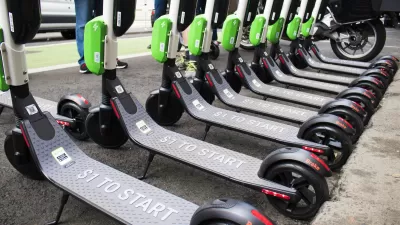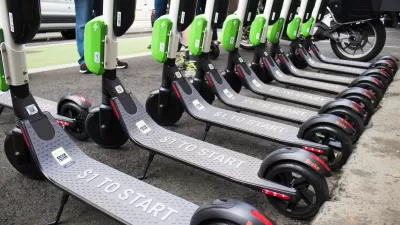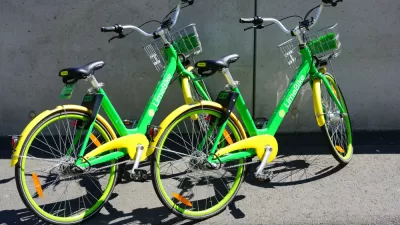Countless ideas have been proposed to bridge the first-mile, last-mile gap: bike share, dockless bike share, ride-hailing services, circulator buses, trolleys, and, of course, good old-fashioned feet. The newest entrant: electric scooters.
"Bird is based in, and was first deployed in, Santa Monica. It has spread to San Diego and elsewhere, and, with a fresh $15 million of capital, more cities are to come. Bird’s careers page lists 13 major cities nationwide where they're hiring. This invasion presents a moral quandary. I want to hate them. They are annoying and juvenile in the way that all “disruptive” technologies are annoying and juvenile. But I find myself oddly attracted to them."
"As an anarchic element of urbanism, the problems Birds pose are mostly minor and probably correctable. But they should not be allowed to fly under the radar, as so many other “disruptive” services have done. The spats between Uber and city governments have become legendary, as arrogance has run headlong into bureaucracy. The same goes for Airbnb, Lyft, and Uber. Bird is already getting into it with the City of Santa Monica (and losing), and San Diego seems none-too-pleased."
"If scooters proliferate, planners have all the more reason to reclaim pavement from cars, creating more sidewalks, bike lanes, or, indeed scooter lanes. Scooters might warrant further transit investments as they widen the traditional walk-sheds of transit stops. They might influence parking requirements and warrant the conversion of on-street parking spaces into scooter corrals. Or maybe they’re benign enough, and our existing streetscapes accommodating enough, that we can indeed let them evolve organically and not freak out about them."
FULL STORY: Short-Distance Mobility Goes to the Birds

Planetizen Federal Action Tracker
A weekly monitor of how Trump’s orders and actions are impacting planners and planning in America.

San Francisco's School District Spent $105M To Build Affordable Housing for Teachers — And That's Just the Beginning
SFUSD joins a growing list of school districts using their land holdings to address housing affordability challenges faced by their own employees.

Vehicle-related Deaths Drop 29% in Richmond, VA
The seventh year of the city's Vision Zero strategy also cut the number of people killed in alcohol-related crashes by half.

The EV “Charging Divide” Plaguing Rural America
With “the deck stacked” against rural areas, will the great electric American road trip ever be a reality?

Judge Halts Brooklyn Bike Lane Removal
Lawyers must prove the city was not acting “arbitrarily, capriciously, and illegally” in ordering the hasty removal.

Engineers Gave America's Roads an Almost Failing Grade — Why Aren't We Fixing Them?
With over a trillion dollars spent on roads that are still falling apart, advocates propose a new “fix it first” framework.
Urban Design for Planners 1: Software Tools
This six-course series explores essential urban design concepts using open source software and equips planners with the tools they need to participate fully in the urban design process.
Planning for Universal Design
Learn the tools for implementing Universal Design in planning regulations.
Borough of Carlisle
Smith Gee Studio
City of Camden Redevelopment Agency
City of Astoria
Transportation Research & Education Center (TREC) at Portland State University
City of Camden Redevelopment Agency
Municipality of Princeton (NJ)





























